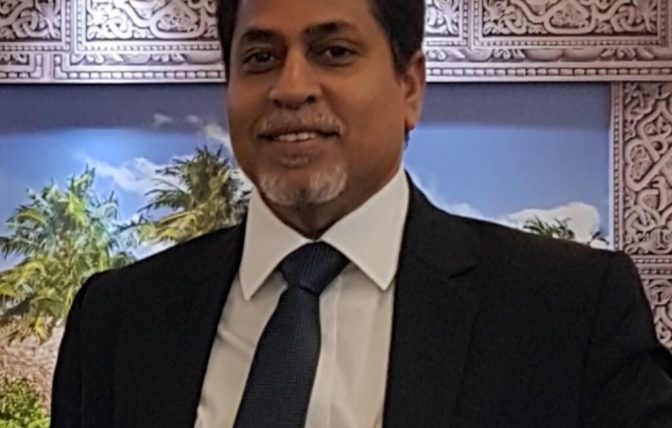

The Director of Sales and Marketing of Villa Hotels, Mr. Ali Rasheed Adam has been working in the Tourism industry for 27+ years now. Started his career as a Software Developer and now known as a Talented Professional Marketer in the Tourism Industry of Maldives. The following highlights his insights and experiences in the industry.
How did you get started in the hotel industry?
Initially, I didn’t like working in the tourism sector because I was a person who wants to go home early and also lacked knowledge of the tourism industry. I was also one of the first software engineers in Maldives to join Villa Group in 1992. During that time Holiday Island and Paradise Island were under construction. A local professional who was looking after reservations for these resorts asked me if I could develop a software to manage bookings and front office. Back then, all the bookings were managed manually. He was the one who taught me how a resort functions, especially the reservations and front office. He later changed resorts and took over as the Reservations and Front Office Manager for Paradise Island Resort when I was about to finish coding the software. There was no one else at the Head Office who knew about the allotments, rates and hotel contracts other than myself. So the management asked me if I could take that responsibility and I accepted it while continuing to develop my own software. That was in 1994 and since then I’ve been working here in marketing. I have dedicated my time exclusively to marketing. Unfortunately, I could not keep up to date with the fast-paced software development technology and am basically an illiterate at computer programming now.
What are some of the biggest challenges you faced in your line of work?
Due to the limited number of beds available at Maldivian resorts at the time, we had no problem selling our quota because operators guarantee allotments as they mainly operate charter flights. Tour operators were obligated to fill the flight seats anyway. Lots of attention was given to control allotments to avoid overbooking. Our bookings were always guaranteed, except for May to July which are historically bad months. During that time guests didn’t have much flexibility to change the holiday periods as their holiday duration depends on the chartered flight schedule. Later, when the scheduled flights started, guests were provided with more options. Everyone says the main challenge in marketing and operation of a resort in Maldives is the costly transfers. This makes it difficult to sell online, especially the resorts away from Velana International Airport.
In 1997 the government released 14 islands for resort development and we had to work hard to get the right kind of partners to fill the new island. The influx of too many beds in a short period of time was a challenge.
Lately, many islands were leased without any control or consideration to the image of the destination. Increase in the number of high-end resorts and budget hotels is a challenge for mid-range resorts. I am not against local island tourism or the guesthouse industry. I strongly believe the guesthouse sector of the industry should be more regulated in the interest of the entire industry. I also believe that the industry should be regulated to protect the interest of all parties.
Another challenge was the political imbalances and coral bleaching (El Nino Effect) which caused the country to have an overall negative image globally. The 2004 Tsunami was another incident we can’t forget. After the catastrophe, Maldives had to do a lot of aggressive marketing, as hotels all over the country suffered from low occupancy.
What are some of your most notable success?
One of my accomplishment includes our contribution to bringing the Chinese market to Maldives with the help of the Tourism Minister at the time. I visited China to introduce Maldives as a product but Maldives was not an approved destination for the Chinese to travel. Maldives was an unknown destination for them. I spend two weeks in China going from one travel agent to the other. I also went to the Ministry of Foreign Affairs in China. Later, in 2000, the Prime Minister of China visited and approved Maldives as a destination for Chinese travelers. Now they are the number one market for Maldives.
Our contribution and hard work in developing new markets like Korea, Russia and India are some of the major achievements I am very proud of.
What are your future plans in the industry?
Currently, our resorts are not marketed in Scandinavia. Therefore, our focus will be to get our resorts marketed there and also to increase our market share in Taiwan. We are also putting extra effort to get a fair share of Australian and South African markets. We believe these are some potential markets that will bring a good impact on the Maldivian Tourism industry.
We are trying to tap markets that we have good connectivity with. We also see the increasing size of European families and requirement for family accommodation. Our products may need to be modified to cater to family travel segment.
What is your advice to the young hoteliers in the industry?
Maldives is a country that poses a lot of unique challenges. Maintaining harmony and tranquility of the destinations is unquestionably essential. It’s the responsibility of every citizen of this country to make sure that harmony exists. Political differences should not impact the harmony on this destination. Whether you’re planning to build a high-end resort or 4 to 5-star entry level resort, do your research before you invest. My advice to young hoteliers is to be patient and hospitable to build a successful career in this industry.